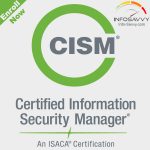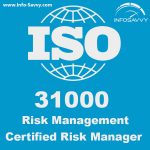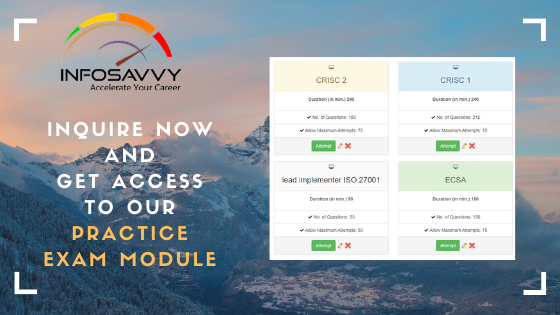CISSP stands for Certified Information System Security Professional. It is an information security certification granted by the International Information System Security Certification Consortium also known as (ISC)². CISSP is considered as gold standard in the field of information security.
The CISSP is ideal for information security professionals seeking to prove their understanding of cybersecurity strategy and hands-on implementation. It shows you have the advanced knowledge and technical skills to design, develop and manage an organization’s overall security posture.
This certification enables you to become an information assurance professional who defines all aspects of IT security, including architecture, design, management, and controls.
The CISSP exam evaluates expertise across eight security domains. (Think of domains as topics you need to master based on your professional experience and education.) Passing the exam proves you have the advanced knowledge and technical skills to effectively design, implement and manage a best-in-class cybersecurity program. Each domain is further divided in chapters and in all there are 21 chapters
Domain 1. Security and risk Management -15%
Domain 2. Asset security -10%
Domain 3. Security Architecture and Engineering -13%
Domain 4. Communication and Network Security -14%
Domain 5. Identity and Access Management -13%
Domain 6. Security Assessment and Testing -12%
Domain 7. Security Operations -13%
Domain 8. Software Development Security -10%
Certified Threat Intelligence Analyst | CTIA
The program was based on a rigorous Job Task Analysis (JTA) of the job roles involved in the field of threat intelligence. This program differentiates threat intelligence professionals from other information security professionals.It is a highly interactive, comprehensive,standards-based, intensive 3-day training
program that teaches information security professionals to build professional threat intelligence.
In the ever-changing threat landscape, C|TIA is an highly essential program for those who deal with cyber threats on a daily basis. Organizations today demand a professional level cybersecurity threat intelligence analyst who can extract the intelligence from data by implementing various advanced strategies. Such professional level programs can only be achieved when the core of the curricula maps with and is compliant to government and industry published threat intelligence frameworks.
C|TIA is a method-driven program that uses a holistic approach, covering concepts from planning the threat intelligence project to building a report to disseminating threat intelligence. These concepts are highly essential while building effective threat intelligence and, when used properly, can secure organizations from future threats or attacks. This program addresses all the stages involved in the Threat Intelligence Life Cycle, with This attention to a realistic and futuristic approach makes C|TIA one of the most comprehensive threat intelligence certifications on the market today. This program provides the solid, professional knowledge that is required for a career in threat intelligence, and enhances your skills as a Threat Intelligence Analyst, increasing your employability. It is desired by most cybersecurity engineers, analysts, and professions from around the world and is respected by hiring authorities.
- Introduction to Threat Intelligence
- Cyber Threats and Kill Chain Methodology
- Requirements, Planning, Direction, and Review
- Data Collection and Processing
- Data Analysis
- Intelligence Reporting and Dissemination
Benefits of Being CISSP Certified
» Carrier Advancement: Raise visibility and credibility, improve job security and create new opportunities.
» Versatile Skills: Vendor-neutral so skills can be applied to different technologies and methodologies.
» Respect: Differentiate yourself to employers, clients and peers.
» Solid foundation: Be better prepared to stem cyber attacks and inspire
a safe and secure cyber world.
» Community of professionals: Gain access to (and respect from) a global community of like- minded cybersecurity leaders.
» Higher salaries: On average, (ISC)2 members report earning 35% more than non-members.
» Expanded knowledge: Reach a deeper, better and broader understanding of the common body of knowledge for cybersecurity.
» Stronger skill set: Expand the skills and knowledge needed to fulfil organizational duties.
Issuing Body : International Information System Security Certification Consortium also known as (ISC)²
WHO should attend (Jobs that Typically Use or Require the CISSP )
» Chief Information Officer » Chief Information Security Officer
» Director of Security » IT Director/Manager
» Network Architect » Security Analyst
» Security Architect » Security Auditor
» Security Consultant » Security Manager
» Security Systems Engineer
CISSP stands for Certified Information System Security Professional. It is an information security certification granted by the International Information System Security Certification Consortium also known as (ISC)². CISSP is considered as gold standard in the field of information security.
The CISSP is ideal for information security professionals seeking to prove their understanding of cybersecurity strategy and hands-on implementation. It shows you have the advanced knowledge and technical skills to design, develop and manage an organization’s overall security posture.
This certification enables you to become an information assurance professional who defines all aspects of IT security, including architecture, design, management, and controls.
Benefits of Being CISSP Certified
» Carrier Advancement: Raise visibility and credibility, improve job security and create new opportunities.
» Versatile Skills: Vendor-neutral so skills can be applied to different technologies and methodologies.
» Respect: Differentiate yourself to employers, clients and peers.
» Solid foundation: Be better prepared to stem cyber attacks and inspire
a safe and secure cyber world.
» Community of professionals: Gain access to (and respect from) a global community of like- minded cybersecurity leaders.
» Higher salaries: On average, (ISC)2 members report earning 35% more than non-members.
» Expanded knowledge: Reach a deeper, better and broader understanding of the common body of knowledge for cybersecurity.
» Stronger skill set: Expand the skills and knowledge needed to fulfil organizational duties.
Issuing Body : International Information System Security Certification Consortium also known as (ISC)²
WHO should attend (Jobs that Typically Use or Require the CISSP )
» Chief Information Officer » Chief Information Security Officer
» Director of Security » IT Director/Manager
» Network Architect » Security Analyst
» Security Architect » Security Auditor
» Security Consultant » Security Manager
» Security Systems Engineer
Fast Facts About CISSP
» Most required Certification on LinkedIn.
» First Information security credential to meet the strict conditions of ISO/IEC standard 17024.
» Till 31 Dec 2018 there were only 2253 CISSP Qualified Professionals in India.
» Average CISSP Salary is US $ 131,030.
» CISSP works I 160 countries GLOBALLY
CISSP Exam Overview/DOMAINS
The CISSP exam evaluates expertise across eight security domains. (Think of domains as topics you need to master based on your professional experience and education.) Passing the exam proves you have the advanced knowledge and technical skills to effectively design, implement and manage a best-in-class cybersecurity program. Each domain is further divided in chapters and in all there are 21 chapters
Domain 1. Security and risk Management -15%
Domain 2. Asset security -10%
Domain 3. Security Architecture and Engineering -13%
Domain 4. Communication and Network Security -14%
Domain 5. Identity and Access Management -13%
Domain 6. Security Assessment and Testing -12%
Domain 7. Security Operations -13%
Domain 8. Software Development Security -10%
Exam Information
CISSP employs Computer Adaptive Testing (CAT) where in the participant gets maximum 3 hours of time to attempt 150 questions. A participant has to achieve a score of 700 out of 1000 to pass the exam.
Testing Centre : Pearson VUE
Hidden fact Generally, CAT analytical engine gives maximum 100-110 question for the first timers i.e. the engine will decide the qualification result in just 100-110 questions. All questions are mix of technical and management orientation. For second timers CAT will explicitly ask applicants to attempt 150 questions in 3 hours.
Prerequisite
To qualify for the CISSP, candidates must pass the exam and have at least five years of cumulative, paid work experience in two or more of the eight domains of the (ISC)2 CISSP Common Body of Knowledge (CBK®).
A candidate who doesn’t yet have the required experience to become a CISSP may become an Associate of (ISC)2 after successfully passing the CISSP exam. The Associate of (ISC)2 will then have six years to earn the experience needed for CISSP certification.
Hidden facts Only thing required to clear CISSP exam is dedication and continuous efforts to understand as well as IMPLEMENT concepts of CBK in to practical life and day to day work.
Other IT Security and Governance Courses














Reviews
There are no reviews yet.